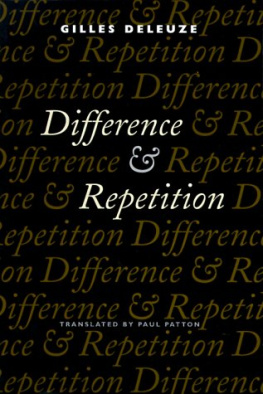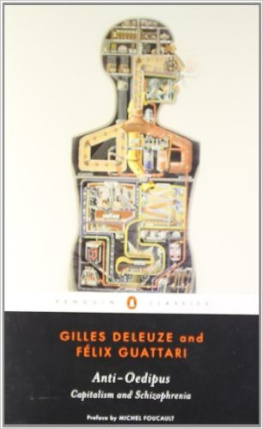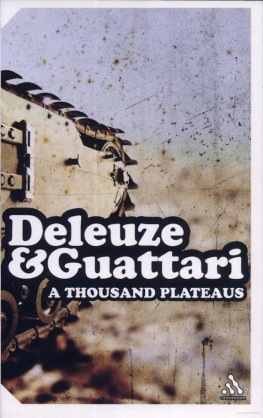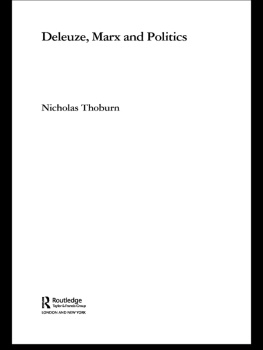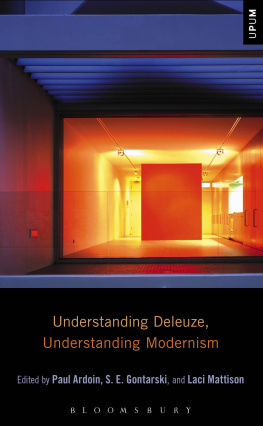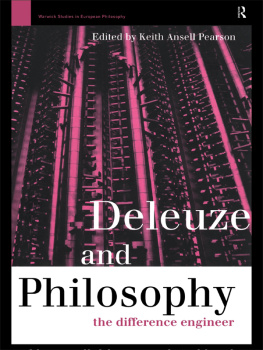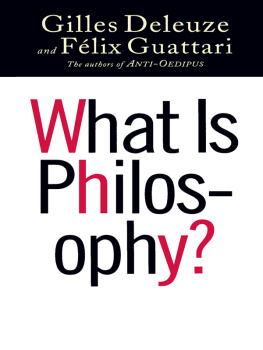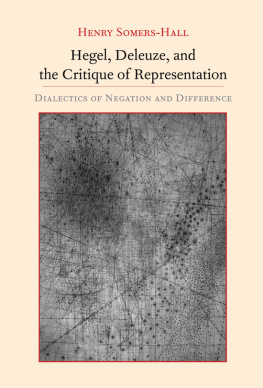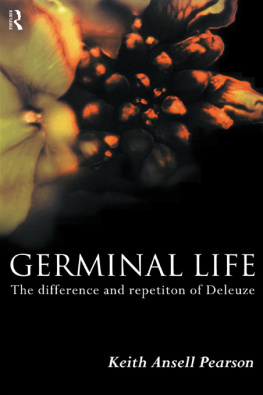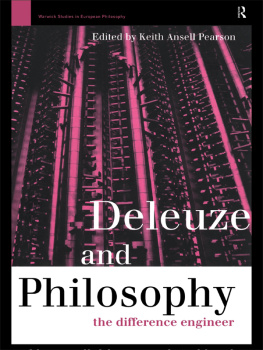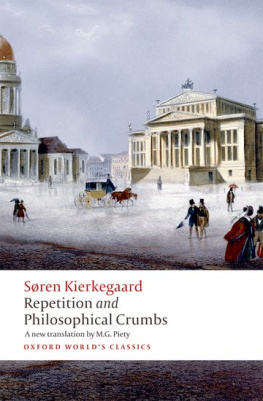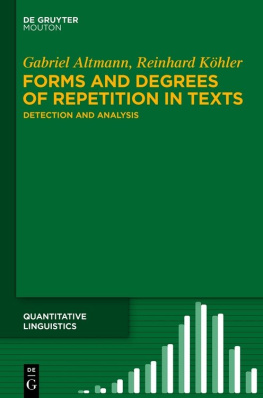Difference& Repetition
Gilles Deleuze
Translatedby Paul Patton
Contents
Translator's Preface
Preface to the English Edition
Preface
INTRODUCTION: REPETITION ANDDIFFERENCE
Repetitionand generality: first distinction from the point of View of conduct - The twoorders of generality: resemblance and equality - Second distinction, from thepoint of view of law - Repetition, law of nature and moral law - The programmeof a philosophy of repetition according to Kierkegaard, Nietzsche and Peguy -True movement, theatre and representation - Repetition and generality: thirddistinction from the point of view of concepts - The comprehension of conceptsand the phenomenon of 'blockage' - The three cases of 'natural blockage' andrepetition: nominal concepts, concepts of nature and concepts of freedomRepetition is not explained by the identity of the concept, any more than it isby a purely negative condition - The functions of the 'death instinct':repetition in its relation to difference and as requiring a positive principle.(The example of concepts of freedom) - The two repetitions: by means of theidentity of the concept and a negative condition, and by means of differenceand excess in the Idea. (Examples of natural and nominal concepts) - The bareand the disguised in repetition - Conceptual difference and difference withoutconcept - But the concept of difference (Idea) cannot be reduced to aconceptual difference, any more than the positive essence of repetition can bereduced to a difference without concept
CHAPTER I - DIFFERENCE IN ITSELF
Differenceand the obscure ground - Must difference be represented? The four aspects ofrepresentation (fourfold root) - The propitious moment, difference, the largeand the small - Conceptual difference: the greatest and best - The logic ofdifference according to Aristotle, and the confusion of the concept ofdifference with conceptual difference - Specific and generic difference - Thefour aspects or the subordination of difference: identity of the concept, analogyof judgement, opposition of predicates, resemblance of the perceived -Difference and organic representation - Univocity and difference - The twotypes of distribution - The impossibility of reconciling univocity and analogy- The moments of the univocal: Duns Scotus, Spinoza, Nietzsche - Repetition inthe eternal return defines the univocity of being - Difference and orgiasticrepresentation (the infinitely large and the infinitely small) - The ground asreason - Logic and ontology of difference according to Hegel: contradiction -Logic and ontology of difference according to Leibniz: vice-diction (continuityand indiscernibles) - How orgiastic or infinite representation of differencedoes not escape the four aspects previously mentioned - Difference, affirmationand negation - The illusion of the negative - Eternal return and theelimination of the negative - The logic and ontology of difference according toPlato - The figures of the method of division: claimants, the ground-test,problems-questions, (non)-being and the status of the negative - That which iscrucial in the problem of difference: simulacra and the resistance of simulacra
CHAPTER II - REPETITION FOR ITSELF
Repetition:something is changed - First synthesis oftime: the living present - Habitus, passive synthesis, contraction,contemplation - The problem of habit - Secondsynthesis of time: the pure past - Memory, pure past and the representationof presents - The four paradoxes of the past - Repetition in habit and inmemory - Material and spiritual repetition - Cartesian Cogito and KantianCogito - The indeterminate, determination, the determinable - The fractured I,the passive self and the empty form of time - Inadequacy of memory: the third synthesis of time - Form,order, totality and series of time - Repetition in the third synthesis: itscondition by default, its agent of metamorphosis, its unconditioned character -The tragic and the comic, history, and faith from the point of view ofrepetition in eternal return - Repetitionand the unconscious: 'Beyond the pleasure principle' - The first synthesisand binding: Habitus - Second synthesis: virtual objects and the past - Erosand Mnemosyne - Repetition, displacement and disguise: difference -Consequences for the nature of the unconscious: the serial, differential andquestioning unconscious - Towards the third synthesis or the third 'beyond':the narcissistic ego, the death instinct and the empty form of time - Deathinstinct, opposition and material repetition - Death instinct and repetition inthe eternal return - Resemblance and difference - What is a system? - The darkprecursor and the 'differenciator' - The literary system - The phantasm orsimulacrum and the three figures of the identical in relation to difference -The true motivation of Platonism lies in the problem of simulacra - Simulacra andrepetition in eternal return
CHAPTER III - THE IMAGE OF THOUGHT
Theproblem of presuppositions in philosophy - First postulate: the principle ofthe Cogitatio natura universalis - Second postulate: the ideal of common sense- Thought and doxa - Third postulate: the model of recognition - Ambiguity ofthe Kantian Critique - Fourth postulate: the element of representation -Differential theory of the faculties - The discordant functioning of thefaculties: the violence and limits of each - Ambiguity of Platonism - Thinking:its genesis in thought - Fifth postulate: the 'negative' of error - Problem ofstupidity - Sixth postulate: the privilege of designation - Sense andproposition - The paradoxes of sense - Sense and problem - Seventh postulate:the modality of solutions - The illusion of solutions in the doctrine of truth- Ontological and epistemological importance of the category of problems -Eighth postulate: the result of knowledge - What does it mean 'to learn'? -Recapitulation of the postulates as obstacles to a philosophy of difference andrepetition
CHAPTER IV - IDEAS AND THESYNTHESIS OF DIFFERENCE
TheIdea as a problematic instance - Indeterminate, determinable and determination:difference - The differential - Quantitability and the principle ofdeterminability - Qualitability and the principle of reciprocal determination -Potentiality and the principle of complete determination (the serial form) -Futility of the infinitely small in differential calculus - Differential andproblematic - Theory of problems: dialectic and science - Idea and multiplicity- Structures: their criteria, the types of Idea - Procedure of vice-diction:the singular and the regular, the distinctive and the ordinary - Ideas and thedifferential theory of the faculties - Problem and question - Imperatives andplay - Ideas and repetition - Repetition, the distinctive and the ordinary -The illusion of the negative - Difference, negation and opposition - Genesis ofthe negative - Ideas and virtuality - The reality of the virtual: ens omni modo... - Differentiation and differenciation; the two halves of the object - Thetwo aspects of each half - The distinction between the virtual and the possible- The differential unconscious; the distinct-obscure - Differenciation asprocess of actualization of Ideas - Dynamisms or dramas - Universality ofdramatization - The complex notion of differentlciation
CHAPTER V - ASYMMETRICAL SYNTHESISOF THE SENSIBLE
Differenceand diversity - Difference and intensity - Cancellation of difference - Goodsense and common sense - Difference and paradox - Intensity, quality,extension: the illusion of cancellation - Depth or the spatium - Firstcharacteristic of intensity: the unequal in itself - Role of the unequal innumber - Second characteristic: affirmation of difference - The illusion of thenegative - The being of the sensible - Third characteristic: implication -Difference in kind and difference of degree - Energy and eternal return -Repetition in the eternal return is neither qualitative nor extensive butintensive - Intensity and differential - Role of individuation in theactualization of Ideas - Individuation and differenciation - Individuation isintensive - Individual difference and individuating difference -'Perplication', 'implication', 'explication' - Evolution of systems - Centresof envelopment - Individuating factors, I and Self - Nature and function of theother in psychic systems
Next page
